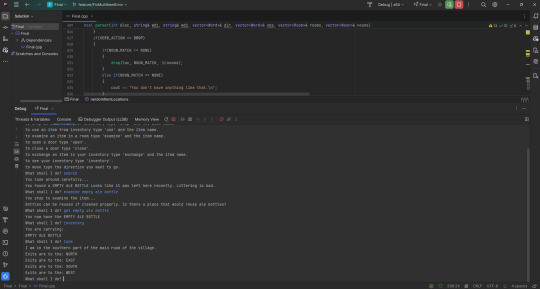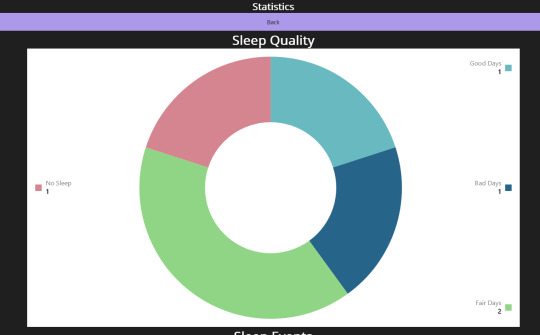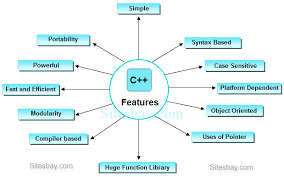#C Programming Course
Explore tagged Tumblr posts
Text
What is C? A Beginner’s Guide to C Language and C Programming
what C is, why it’s important, and how you can get started with C programming When it comes to programming languages, C holds a special place as one of the most popular and foundational languages in the software development world.

Whether you’re just starting your coding journey or want to build a strong base for advanced programming, understanding C is essential. Let’s dive into what C is, why…
#c programming#programming#c programming language#c programming for beginners#c (programming language)#c programming tutorial#programming in c#c programming course#programming language#c programming full course#programming for beginners#programming fundamentals#programming hero#programming language (software genre)#programming memes#c language programming#programiz c programming#c programming language tutorial#learn c programming#c programming basics
2 notes
·
View notes
Text
Advanced C Programming: Mastering the Language
Introduction
Advanced C programming is essential for developers looking to deepen their understanding of the language and tackle complex programming challenges. While the basics of C provide a solid foundation, mastering advanced concepts can significantly enhance your ability to write efficient, high-performance code.
1. Overview of Advanced C Programming
Advanced C programming builds on the fundamentals, introducing concepts that enhance efficiency, performance, and code organization. This stage of learning empowers programmers to write more sophisticated applications and prepares them for roles that demand a high level of proficiency in C.
2. Pointers and Memory Management
Mastering pointers and dynamic memory management is crucial for advanced C programming, as they allow for efficient use of resources. Pointers enable direct access to memory locations, which is essential for tasks such as dynamic array allocation and manipulating data structures. Understanding how to allocate, reallocate, and free memory using functions like malloc, calloc, realloc, and free can help avoid memory leaks and ensure optimal resource management.
3. Data Structures in C
Understanding advanced data structures, such as linked lists, trees, and hash tables, is key to optimizing algorithms and managing data effectively. These structures allow developers to store and manipulate data in ways that improve performance and scalability. For example, linked lists provide flexibility in data storage, while binary trees enable efficient searching and sorting operations.
4. File Handling Techniques
Advanced file handling techniques enable developers to manipulate data efficiently, allowing for the creation of robust applications that interact with the file system. Mastering functions like fopen, fread, fwrite, and fclose helps you read from and write to files, handle binary data, and manage different file modes. Understanding error handling during file operations is also critical for building resilient applications.
5. Multithreading and Concurrency
Implementing multithreading and managing concurrency are essential skills for developing high-performance applications in C. Utilizing libraries such as POSIX threads (pthreads) allows you to create and manage multiple threads within a single process. This capability can significantly enhance the performance of I/O-bound or CPU-bound applications by enabling parallel processing.
6. Advanced C Standard Library Functions
Leveraging advanced functions from the C Standard Library can simplify complex tasks and improve code efficiency. Functions for string manipulation, mathematical computations, and memory management are just a few examples. Familiarizing yourself with these functions not only saves time but also helps you write cleaner, more efficient code.
7. Debugging and Optimization Techniques
Effective debugging and optimization techniques are critical for refining code and enhancing performance in advanced C programming. Tools like GDB (GNU Debugger) help track down bugs and analyze program behavior. Additionally, understanding compiler optimizations and using profiling tools can identify bottlenecks in your code, leading to improved performance.
8. Best Practices in Advanced C Programming
Following best practices in coding and project organization helps maintain readability and manageability of complex C programs. This includes using consistent naming conventions, modularizing code through functions and header files, and documenting your code thoroughly. Such practices not only make your code easier to understand but also facilitate collaboration with other developers.
9. Conclusion
By exploring advanced C programming concepts, developers can elevate their skills and create more efficient, powerful, and scalable applications. Mastering these topics not only enhances your technical capabilities but also opens doors to advanced roles in software development, systems programming, and beyond. Embrace the challenge of advanced C programming, and take your coding skills to new heights!
#C programming#C programming course#Learn C programming#C programming for beginners#Online C programming course#C programming tutorial#Best C programming course#C programming certification#Advanced C programming#C programming exercises#C programming examples#C programming projects#Free C programming course#C programming for kids#C programming challenges#C programming course online free#C programming books#C programming guide#Best C programming tutorials#C programming online classes
2 notes
·
View notes
Text
Learn Best C Programming Language Courses
C Language is one of the most basic or beginner C Programming Languages Course, C Language has had a direct bearing on most of the programming languages that have evolved out of it, and one must at least have an understanding of what is C Language in order to be able to boss any language around. As getting complete knowledge of programming languages is very crucial and essential to enter the world of development which is considered to be the most competitive ad prestigious profession and high paying job in today’s world. So to begin the journey of learning C, you can do so with some of the best courses.
Takeoff upskill today we are going to discuss the 10 Best C Programming Courses for Beginners: these are the best courses offering you good content for learning and at the meantime issued a certificate after completion of the course. To summarize, let’s consider each of them in detail, and perhaps you will decide which method is more suitable for you.
Takeoff upskill should first read some of the C programming language information before explaining the best courses to take for C programming.

Introduction to C Programming:
An overview of C language and where it fits.
Environmental planning (IDEs- for instance VS Code, Dev-C++, etc.).
The bare structure of a C program includes the following categories:
The first process that you need to go through when writing a “Hello World” program involves writing your first program and compiling it.
Variables and Data Types:
Knowledge regarding the different variable types that are available like integers, floating-point numbers, character, etc.
Declaring and initializing variables.
Basic arithmetic operations.
Control Flow:
Conditional statements (if-else, switch-case).
Control of experiments through looping structures such as for, while, do while.
Annotation of code using breaks and continues.
Functions:
Functions and their significance for calculating regularities.
Function declaration and definition.
Passing arguments to functions.
Returning values from functions.
Arrays and Strings:
Declaring and initializing arrays.
Accessing array elements.
Input-output (printf, scan, etc.), string manipulations (strcpy, strcat, strlen, etc.)
Multi-dimensional arrays.
Pointers:
What pointers are, why there are used, and how they and memory addresses?
Pointer arithmetic.
Pointers and arrays.
Malloc, calloc, realloc for dynamic memory allocation and free to free the memory space allocated dynamically.
Structures and Unions:
Defining and using structures.
Accessing structure members.
Nested structures.
Introduction to unions.
File Handling:
Reading and writing files from C (structuring, opening, accessing and closing).
Position(s) of the file (open, read-only, write-only or append)
Different methods, which should be implemented for error handling while processing the files.
Preprocessor Directives:
Significantly, one of the areas that most students face great trouble in is tackling pre-processor directives (#define, #include, #ifdef, etc.)
Taking advantage of macros throughout the program’s code to reduce code redundancy and increase signal-to-clutter ratio, thus improving code readability and maintainability.
Advanced Topics:
Recursion.
Enumerations.
Typedef.
Bitwise operations.
Command line arguments.
Best Practices and Tips:
Coding conventions and standards.
Debugging techniques.
Memory management practices.
Performance optimization tips.
Projects and Exercises:
Giving out a few Specific tasks and activities that come under the topic in question so as to ensure that the knowledge imparted is put into practice.
So if you’re looking for a project that will allow you to use C programming, the following are some suggestions to consider.
CONCLUSION:
All of these topics can be developed into full-scale articles, with various examples and subtopics further elaborated with actual code snippets and describes. To encourage the reader, they can also include quizzes or coding challenges at the end of each section for the reader to solve before moving to the next section. However, using the samples for download and the exercises which are usually included in the lessons make the lessons more effective.
#C Programming Language#C Programming course#Online & Offline course#IT & Software Course#Software course
0 notes
Text
Learn Best C Programming Language Courses
C Language is one of the simplest or entry-level C Programming Language Courses, C Language has caused a direct impact on most of the C Programming Languages that have been derived from it and it is a fact that if you have to at least have some idea of what is C Language in order to at least tell off any language.
Hence, it is a very important must for getting complete knowledge of programming languages so that it may easily enter the world of development which is one of the most competitive and prestigious professions and highly paid jobs of the modern world. Therefore, if you want to start the process and learn the basics of C, you are welcome to start with some of the courses listed above.

Takeoff upskill Today we are going to discuss the 10 Best C Programming Courses for Beginners: these are some of the best to choose from; they provide you with good content for learning and at the same time when you complete the course you are awarded with a certificate. In conclusion, we might want to expand on all of them and maybe you will be able to make your choice as to which of the methods is the most helpful to you.
Takeoff upskill is still new to C programming language information, then, before pointing beginners to the best courses to take for C programming language.
Conclusion:
All of these topics can be built up into a whole article on their own, where the various examples can be expanded upon with actual code snippets, and where they can describe in detail more subtopics. For motivation, the authors can also include questions and sometimes coding problems that the reader solves before advancing to the next section. However, employing the samples for download and the exercises which are often a part of the lessons help to make the lessons efficient. Takeoffupskill, a leader in technology and business education, exemplifies these principles in its courses.
#C Programming Language#C Programming#Programming Languages#C Programming Course#Programming Language
0 notes
Text
0 notes
Text
Which coding languages should I learn to boost my IT career opportunities?
A career in IT needs a mix of versatile programming languages. Here are some of the most essential ones:

Python – Easy to learn and widely used for data science, machine learning, web development, and automation.
JavaScript – Key for web development, allowing interactive websites and backend work with frameworks like Node.js.
Java – Known for stability, popular for Android apps, enterprise software, and backend development.
C++ – Great for systems programming, game development, and areas needing high performance.
SQL – Essential for managing and querying databases, crucial for data-driven roles.
C# – Common in enterprise environments and used in game development, especially with Unity.
24 notes
·
View notes
Text


Still thinking about Chuck E. in his little summer fit and the bird having flowers too ♡ And yes, they’re also doing the Beach Party Bash live show to go with the theme 🥺
It’s giving bro has made peace with his upcoming retirement but we’re not unpacking that
#this is crystal lake IL btw#on tuesday 7/16 so i imagine he’s still there like this to see#he of course is on random movements but from the fluidity of those i think he could fulfill proper programming beautifully#i think he’s an excellent candidate to be moved to nanuet#but maybe im just biased and already emotionally attached after getting to see him for an hour and a half#also we asked and they don’t know their 2.0 date yet#chuck e cheese#animatronics#gray makes waves#cec#studio c
31 notes
·
View notes
Text




Days 110 to 118 of coding everyday for a year and I've gotten so much done!
I finish both of my finals the C++ and the C#. The C++ final is an adventure game and it wasn't too challenging to make honestly I had fun with it. The C# project was also fun because I got to play with microcharts when creating the statistics page to display collected data! I plan to make the C++ game more fun honestly because I can't just let it die from here. I am going to make the Android and iOS build better on the C# project. I'm really proud of myself today :)
My next adventures will be brushing up on JavaScript since I'm severely out of practice and using what I know to make my portfolio website using Blazor!
#self improvement#cosmickittytalk#codeblr#csharp programming#csharp#csharp is superior#girls who code#programming#coding challenge#coding for a year#coding exercises#coding#learning new syntax#learning programming#learning to code#college homework#college life#college finals#computer science major#programmer#work in progress#maui app#.net developers#.net framework#.net development#.net core#.net maui#.net#c++ course#c++ programming
17 notes
·
View notes
Text
C++ Programming Language – A Detailed Overview
C++ is a effective, high-overall performance programming language advanced as an extension of the C language. Created via Bjarne Stroustrup at Bell Labs in the early Eighties, C++ delivered object-orientated features to the procedural shape of C, making it appropriate for large-scale software program development. Over the years, it has emerge as a extensively used language for machine/software program improvement, game programming, embedded systems, real-time simulations, and extra.
C ++ Online Compliers

C++ combines the efficiency and manage of C with functions like classes, items, inheritance, and polymorphism, permitting builders to construct complex, scalable programs.
2. Key Features of C++
Object-Oriented: C++ supports object-orientated programming (OOP), which include encapsulation, inheritance, and polymorphism.
Compiled Language: Programs are compiled to machine code for overall performance and portability.
Platform Independent (with Compiler Support): Though not inherently platform-unbiased, C++ programs can run on a couple of structures when compiled therefore.
Low-Level Manipulation: Like C, C++ permits direct reminiscence get right of entry to thru suggestions.
Standard Template Library (STL): C++ consists of powerful libraries for facts systems and algorithms.
Rich Functionality: Supports functions like feature overloading, operator overloading, templates, and exception dealing with.
3. Structure of a C++ Program
Here’s a primary C++ program:
cpp
Copy
Edit
#encompass <iostream>
the use of namespace std;
int important()
cout << "Hello, World!" << endl;
return zero;
Explanation:
#encompass <iostream> consists of the enter/output stream library.
Using namespace std; allows using standard capabilities like cout without prefixing std::.
Foremost() is the access point of every C++ program.
Cout prints textual content to the console.
Four. Data Types and Variables
C++ has both primitive and user-defined statistics types. Examples:
cpp
Copy
Edit
int a = 10;
glide b = 3.14;
char c = 'A';
bool isReady = true;
Modifiers like short, lengthy, signed, and unsigned extend the information sorts’ range.
5. Operators
C++ supports, !
Assignment Operators: =, +=, -=, and many others.
Increment/Decrement: ++, --
Bitwise Operators: &,
cout << "a is greater";
else
cout << "b is extra";
Switch Case:
cpp
Copy
Edit
transfer (desire)
case 1: cout << "One"; ruin;
case 2: cout << "Two"; smash;
default: cout << "Other";
Loops:
For Loop:
cpp
Copy
Edit
for (int i = zero; i < five; i++)
cout << i << " ";
While Loop:
cpp
Copy
Edit
int i = 0;
at the same time as (i < five)
cout << i << " ";
i++;
Do-While Loop:
cpp
Copy
Edit
int i = zero;
do
cout << i << " ";
i++;
whilst (i < 5);
7. Functions
Functions in C++ growth modularity and reusability.
Cpp
Copy
Edit
int upload(int a, int b)
go back a + b;
int major()
cout << upload(three, 4);
return 0;
Functions may be overloaded via defining multiple variations with special parameters.
Eight. Object-Oriented Programming (OOP)
OOP is a chief energy of C++. It makes use of instructions and objects to represent real-international entities.
Class and Object Example:
cpp
Copy
Edit
magnificence Car
public:
string logo;
int pace;
void display()
cout << brand << " velocity: " << pace << " km/h" << endl;
int main()
Car myCar;
myCar.Emblem = "Toyota";
myCar.Pace = 120;
myCar.Show();
go back zero;
9. OOP Principles
1. Encapsulation:
Binding facts and features into a unmarried unit (elegance) and proscribing get admission to the usage of private, public, or blanketed.
2. Inheritance:
Allows one magnificence to inherit properties from another.
Cpp
Copy
Edit
elegance Animal
public:
void talk() cout << "Animal sound" << endl;
;
class Dog : public Animal
public:
void bark() cout << "Dog barks" << endl;
; three. Polymorphism:
Same characteristic behaves in a different way primarily based at the item or input.
Function Overloading: Same feature name, special parameters.
Function Overriding: Redefining base magnificence method in derived magnificence.
Four. Abstraction:
Hiding complicated information and showing handiest vital capabilities the usage of training and interfaces (abstract training).
10. Constructors and Destructors
Constructor: Special approach known as while an item is created.
Destructor: Called whilst an item is destroyed.
Cpp
Copy
Edit
magnificence Demo
public:
Demo()
cout << "Constructor calledn";
~Demo()
cout << "Destructor calledn";
;
11. Pointers and Dynamic Memory
C++ supports tips like C, and dynamic memory with new and delete.
Cpp
Copy
Edit
int* ptr = new int; // allocate reminiscence
*ptr = 5;
delete ptr; // deallocate memory
12. Arrays and Strings
cpp
Copy
Edit
int nums[5] = 1, 2, three, 4, 5;
cout << nums[2]; // prints 3
string name = "Alice";
cout << call.Period();
C++ also supports STL boxes like vector, map, set, and many others.
Thirteen. Standard Template Library (STL)
STL offers established training and features:
cpp
Copy
Edit
#consist of <vector>
#consist of <iostream>
using namespace std;
int important()
vector<int> v = 1, 2, 3;
v.Push_back(four);
for (int i : v)
cout << i << " ";
STL includes:
Containers: vector, list, set, map
Algorithms: sort, discover, rely
Iterators: for traversing containers
14. Exception Handling
cpp
Copy
Edit
attempt
int a = 10, b = 0;
if (b == zero) throw "Division by means of 0!";
cout << a / b;
seize (const char* msg)
cout << "Error: " << msg;
Use attempt, capture, and throw for managing runtime errors.
15. File Handling
cpp
Copy
Edit
#consist of <fstream>
ofstream out("information.Txt");
out << "Hello File";
out.Near();
ifstream in("records.Txt");
string line;
getline(in, line);
cout << line;
in.Near();
File I/O is achieved the usage of ifstream, ofstream, and fstream.
16. Applications of C++
Game Development: Unreal Engine is primarily based on C++.
System Software: Operating systems, compilers.
GUI Applications: Desktop software (e.G., Adobe merchandise).
Embedded Systems: Hardware-level applications.
Banking and Finance Software: High-speed buying and selling systems.
Real-Time Systems: Simulations, robotics, and so on.
17. Advantages of C++
Fast and efficient
Wide range of libraries
Suitable for each high-level and low-level programming
Strong item-orientated aid
Multi-paradigm: procedural + object-oriented
18. Limitations of C++
Manual reminiscence management can lead to mistakes
Lacks contemporary protection functions (in contrast to Java or Python)
Steeper studying curve for beginners
No built-in rubbish series
19. Modern C++ (C++11/14/17/20/23)
Modern C++ variations introduced capabilities like:
Smart recommendations (shared_ptr, unique_ptr)
Lambda expressions
Range-based totally for loops
car kind deduction
Multithreading support
Example:
cpp
Copy
Edit
vector<int> v = 1, 2, three;
for (auto x : v)
cout << x << " ";
C++ is a effective, high-overall performance programming language advanced as an extension of the C language. Created via Bjarne Stroustrup at Bell Labs in the early Eighties, C++ delivered object-orientated features to the procedural shape of C, making it appropriate for large-scale software program development. Over the years, it has emerge as a extensively used language for machine/software program improvement, game programming, embedded systems, real-time simulations, and extra.
C ++ Online Compliers
C++ combines the efficiency and manage of C with functions like classes, items, inheritance, and polymorphism, permitting builders to construct complex, scalable programs.
2. Key Features of C++
Object-Oriented: C++ supports object-orientated programming (OOP), which include encapsulation, inheritance, and polymorphism.
Compiled Language: Programs are compiled to machine code for overall performance and portability.
Platform Independent (with Compiler Support): Though not inherently platform-unbiased, C++ programs can run on a couple of structures when compiled therefore.
Low-Level Manipulation: Like C, C++ permits direct reminiscence get right of entry to thru suggestions.
Standard Template Library (STL): C++ consists of powerful libraries for facts systems and algorithms.
Rich Functionality: Supports functions like feature overloading, operator overloading, templates, and exception dealing with.
3. Structure of a C++ Program
Here’s a primary C++ program:
cpp
Copy
Edit
#encompass <iostream>
the use of namespace std;
int important()
cout << "Hello, World!" << endl;
return zero;
Explanation:
#encompass <iostream> consists of the enter/output stream library.
Using namespace std; allows using standard capabilities like cout without prefixing std::.
Foremost() is the access point of every C++ program.
Cout prints textual content to the console.
Four. Data Types and Variables
C++ has both primitive and user-defined statistics types. Examples:
cpp
Copy
Edit
int a = 10;
glide b = 3.14;
char c = 'A';
bool isReady = true;
Modifiers like short, lengthy, signed, and unsigned extend the information sorts’ range.
5. Operators
C++ supports, !
Assignment Operators: =, +=, -=, and many others.
Increment/Decrement: ++, --
Bitwise Operators: &,
cout << "a is greater";
else
cout << "b is extra";
Switch Case:
cpp
Copy
Edit
transfer (desire)
case 1: cout << "One"; ruin;
case 2: cout << "Two"; smash;
default: cout << "Other";
Loops:
For Loop:
cpp
Copy
Edit
for (int i = zero; i < five; i++)
cout << i << " ";
While Loop:
cpp
Copy
Edit
int i = 0;
at the same time as (i < five)
cout << i << " ";
i++;
Do-While Loop:
cpp
Copy
Edit
int i = zero;
do
cout << i << " ";
i++;
whilst (i < 5);
7. Functions
Functions in C++ growth modularity and reusability.
Cpp
Copy
Edit
int upload(int a, int b)
go back a + b;
int major()
cout << upload(three, 4);
return 0;
Functions may be overloaded via defining multiple variations with special parameters.
Eight. Object-Oriented Programming (OOP)
OOP is a chief energy of C++. It makes use of instructions and objects to represent real-international entities.
Class and Object Example:
cpp
Copy
Edit
magnificence Car
public:
string logo;
int pace;
void display()
cout << brand << " velocity: " << pace << " km/h" << endl;
int main()
Car myCar;
myCar.Emblem = "Toyota";
myCar.Pace = 120;
myCar.Show();
go back zero;
9. OOP Principles
1. Encapsulation:
Binding facts and features into a unmarried unit (elegance) and proscribing get admission to the usage of private, public, or blanketed.
2. Inheritance:
Allows one magnificence to inherit properties from another.
Cpp
Copy
Edit
elegance Animal
public:
void talk() cout << "Animal sound" << endl;
;
class Dog : public Animal
public:
void bark() cout << "Dog barks" << endl;
; three. Polymorphism:
Same characteristic behaves in a different way primarily based at the item or input.
Function Overloading: Same feature name, special parameters.
Function Overriding: Redefining base magnificence method in derived magnificence.
Four. Abstraction:
Hiding complicated information and showing handiest vital capabilities the usage of training and interfaces (abstract training).
10. Constructors and Destructors
Constructor: Special approach known as while an item is created.
Destructor: Called whilst an item is destroyed.
Cpp
Copy
Edit
magnificence Demo
public:
Demo()
cout << "Constructor calledn";
~Demo()
cout << "Destructor calledn";
;
11. Pointers and Dynamic Memory
C++ supports tips like C, and dynamic memory with new and delete.
Cpp
Copy
Edit
int* ptr = new int; // allocate reminiscence
*ptr = 5;
delete ptr; // deallocate memory
12. Arrays and Strings
cpp
Copy
Edit
int nums[5] = 1, 2, three, 4, 5;
cout << nums[2]; // prints 3
string name = "Alice";
cout << call.Period();
C++ also supports STL boxes like vector, map, set, and many others.
Thirteen. Standard Template Library (STL)
STL offers established training and features:
cpp
Copy
Edit
#consist of <vector>
#consist of <iostream>
using namespace std;
int important()
vector<int> v = 1, 2, 3;
v.Push_back(four);
for (int i : v)
cout << i << " ";
STL includes:
Containers: vector, list, set, map
Algorithms: sort, discover, rely
Iterators: for traversing containers
14. Exception Handling
cpp
Copy
Edit
attempt
int a = 10, b = 0;
if (b == zero) throw "Division by means of 0!";
cout << a / b;
seize (const char* msg)
cout << "Error: " << msg;
Use attempt, capture, and throw for managing runtime errors.
15. File Handling
cpp
Copy
Edit
#consist of <fstream>
ofstream out("information.Txt");
out << "Hello File";
out.Near();
ifstream in("records.Txt");
string line;
getline(in, line);
cout << line;
in.Near();
File I/O is achieved the usage of ifstream, ofstream, and fstream.
16. Applications of C++
Game Development: Unreal Engine is primarily based on C++.
System Software: Operating systems, compilers.
GUI Applications: Desktop software (e.G., Adobe merchandise).
Embedded Systems: Hardware-level applications.
Banking and Finance Software: High-speed buying and selling systems.
Real-Time Systems: Simulations, robotics, and so on.
17. Advantages of C++
Fast and efficient
Wide range of libraries
Suitable for each high-level and low-level programming
Strong item-orientated aid
Multi-paradigm: procedural + object-oriented
18. Limitations of C++
Manual reminiscence management can lead to mistakes
Lacks contemporary protection functions (in contrast to Java or Python)
Steeper studying curve for beginners
No built-in rubbish series
19. Modern C++ (C++11/14/17/20/23)
Modern C++ variations introduced capabilities like:
Smart recommendations (shared_ptr, unique_ptr)
Lambda expressions
Range-based totally for loops
car kind deduction
Multithreading support
Example:
cpp
Copy
Edit
vector<int> v = 1, 2, three;
for (auto x : v)
cout << x << " ";
C Lanugage Compliers
2 notes
·
View notes
Text
My biggest argument against god's existence is that cpp exists
#cpp#cppprogramming#c++ language#c++ programming#c++#c++ course#learning cpp#learning c++#what the hell is this language?
7 notes
·
View notes
Text
Got jumpscared by my own full legal name showing up in my email notifications bc I forgot I emailed my code to myself today just in case my VM ends up stopping working again (I got nervous & didn't wanna lose my progress lol)
Goldfish level memory retention
& the funny thing is that the email itself is just. This

Full Legal Name code • hi
#speculation nation#title 'code' email is just 'hi'. with the .c file attached of course#honestly i had a very productive day in lab today. i got the core structure of the program down and made sure it all worked#testing it with One of the sorting algorithms. and it worked!!#the lab is to code functions for different kinds of sorts. like bubble sort selection sort and uhh. some other shit idr rn#and have the functions take timestamps from before and after they run the sorts to calculate the elapsed time#and we have to run this for array sizes of like. 10 50 500 etc etc up to like 50000 or smth? if i remember right.#and then once all that's done we take the output and graph the time elapsed for each type of sort/search per array sizes#so today at lab i made the random array generator function. a swap function. the execution function. bubble sort. and main.#main calls the execution function passing in the array sizes. execution(10); execution(50); etc#execution defines the array of that size. then calls the random number generator to populate the array. then passes it to the sort functions#tested with my one bubble sort function. which finished in like 0.00003 seconds or smth for array size 10#BUT taking the time stamps was tricky. there are a lot of ways to do that. and time(); in c is in full seconds#i ended up asking the TA if he had a recommendation for what to use bc theres a LOT of time functions out there#and full seconds isnt precise enough for this purpose. & he recommended clock()!!#records number of clock ticks which is NOT the same as seconds. but when u divide it by uh. forgetting it rn but it's a constant#that will turn it into actual seconds. clock tics per sec?? smth like that.#so anyways very productive 👍 i just need to set main up to call execution function for all the different array sizes#and then write all the functions for the different sorts/searches. but i have the core structure down with the bubble sort function#(specifically with the time stamps and the print function after) that i will copy-paste for all the other functions#and then inside them i put the basic code. none of it's complicated. all can be found on the internet easy.#SO!!!!! honestly i think itd take me less than an hour to finish. tho plotting out that graph is going to be annoying#something like 6 sizes per 5 sort/search functions. painstakingly copy pasting each one into excel or smth lol#but yea im content with how much ive gotten done. yippee!!!!#now i just need to finish my web programming lab before sunday night. blehhhhh
2 notes
·
View notes
Text

ijbol. it's the lack of self awareness for me are you aware that not one. single. person. in your batch. can get through one of your stupid labs without using unfair means
#i guess that's just what happens when you idk. tell them they have to learn a whole ass programming language in ONE DAY.#with no notice.#that you test them on twice a week.#yeah ill give you a suggestion -#MY CHAPPAL.#don't get me wrong he's a sweetheart but he's so DUMB. and his course had so much potential but it's so evil.#have i mentioned last year the entire batch flunked. yeah.#c++blogging#college hateposting
13 notes
·
View notes
Text
Tumblr help me, a beginner, learn C++ cause i’ve shot myself in the foot and have four months before our ICT prof makes us start coding, h e l p
2 notes
·
View notes
Text


#2nd year in my program has a reputation for being the absolute worst part of it#it’s orals year (the exam is at the end)#but we still also have a full course load and a research project and workshop commitments and (for those that need it) language classes#plus. I have publication commitments. two dictionary articles (blessedly done). and a chapter#and I will lose my ever loving mind if I don’t get to go the gym every day#so it’s a lot. (a lot on a good day. hell on most really)#the unsurprisingly result of this is that I have been exhausted and stressed to the max#when I got back from one of my orals prep classes today#I was working on the research paper for my Maimonides class and got a call out of the blue that I had a DHL delivery#which was very confusing#b/c the only things I’ve ordered recently were coming via UPS#lo and behold#one of my best friends from LSE who still lives in London#sent me surprise birthday gifts from harrods#a moleskin and a box of their Knightsbridge blend tea!#I adore the gifts of course#but it mostly just made me feel very grateful to he remembered and loved in that way#(my birthday is actually the Saturday after this coming one. the vagaries of international shipping are not her fault though)#me stuff#not the stones#(((also please excuse the tea cupboard. my collection does in fact take up an entire large kitchen cabinet and go three rows back on the#bottom shelf. I may have a problem)))
6 notes
·
View notes
Text
What is Black Box AI?
Black Box AI refers to AI systems that make decisions without revealing how they arrived at those conclusions, making it difficult to understand their internal workings.
Is it going to take the jobs of programmers?
Black Box AI may automate some routine coding tasks, potentially reducing entry-level programming jobs. However, it will also enhance productivity for experienced programmers and create new roles in AI ethics and oversight. Ultimately, while it will change the nature of programming work, it is unlikely to eliminate programming jobs entirely. Adaptability will be essential.
7 notes
·
View notes
Text
Day 5/100 of coding ♡ <C#>
IM BACKKK!! had a lil break, used up my 3G in turkey but now I'm home & back at it <3
♡ small progress is still progress
♡ plan: code every day for 100 days, focus on practice rather than theory
10.08.23: Finished the loops chapter in the course I'm taking (with Dennis Panjuta, C# Masterclass) and finally got to the OOP chapter - this will all be in the exam I'm having soonD:
Practicing by doing small project after another, I'm having a hard time with getters and setters though:( I'll get the hang of it I'm sure!!
{not my picture, cred to owner<3}

5 notes
·
View notes